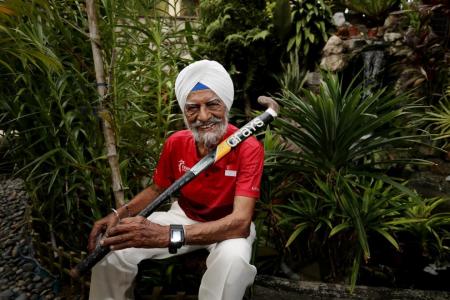Singapore's oldest Olympian Ajit Singh Gill dies
A teacher, an Olympian and a double international, who even in his late 80s still competed and won sporting competitions.
Singapore lost its oldest Olympian and one of its most vibrant sportsmen on Jan 16, when former national hockey and cricket player Ajit Singh Gill died aged 95.
Ajit, who competed in the 1956 Melbourne Olympics, was battling renal failure. He is survived by his 92-year-old wife Surjit Kaur, five children, 10 grandchildren and five great-grandchildren.
His eldest son Mel Gill, a psychologist, said his father fractured his hip last February after a fall, but “healed sufficiently in three months”. However, his health deteriorated later on owing to renal failure.
“Up until he fractured his hip, he was playing golf three times a week,” he told Engish-language Indian weekly Tabla. “He couldn’t have surgery because he had several allergies, but he was a trooper; he ploughed on, and even from his bed at home he was always more concerned about everyone else. That was just how he was.”
Singapore Hockey Federation president Mathavan Devadas, who knew Ajit for more than 50 years, said he was an iconic figure. “He was someone who, even in his 90s, was very active, still playing golf. He would always be available to come for events, to talk to players and share his experiences – he was an inspiration,” said Mathavan.
Born in Kuala Lumpur in 1928, Ajit was the oldest of 10 siblings and lived through the Japanese occupation in Malaya during World War II.
As a young athlete, he excelled in hockey and represented Selangor at 17.
He moved to Singapore in 1951 to enrol in the Teacher’s Training College. Within five years, he donned Singapore’s colours at the Melbourne Olympics, where he and his teammates finished eighth in Singapore hockey’s first and only appearance at the Games.
In the 1960s, he showed his all-round sporting ability when he swapped his hockey stick for a cricket bat, once again representing Singapore in various international matches.
His friend, former national hockey player Harbhajan Singh Loomba, 85, who played both hockey and cricket alongside Ajit for the Indian Association, said that, as a teammate, there was no one better than him.
“He was a humble, very friendly person, and I’m happy to have known him for so many years – since 1956 when we were both part of the teachers’ union,” Loomba said.
“He was outstanding in both sports. You couldn’t have asked for a better teammate. He spoke to everyone and always advised the younger players.”
Local sports enthusiast A. Thiyaga Raju remembers Ajit fondly, as he was a student at Queenstown Secondary School in 1974 when Ajit taught there. The two also kept in touch over the following decades.
Mr Raju wrote in a Facebook post on Wednesday: “In 2016, when I hosted a surprise birthday party for Mr Ajit at his Teachers’ Housing Estate residence, he excitedly showed me old newspaper cuttings and scrapbooks containing articles on him, and reminisced about his glory days as an Olympian.
“He proudly shared with me that it was in Melbourne during the Games that he bought a proposal ring for his future wife.”
In his later years, Ajit kept active through golf and race walking. His penchant for winning carried on as he topped the Asean Senior Amateur Golf Championship in 1990. In 2016, he claimed gold in the 5,000m race walk at the Asia Masters Athletics Championships.
And in 2010, he was one of the 2,400 torch-bearers – and the oldest – at the Singapore leg of the Youth Olympic Games torch relay.
“He may have been physically old, but mentally, he was sharp,” explained his son Mel when asked how Ajit kept himself active even in his advanced years.
“He had an awesome mindset. He always felt that you could only improve by doing something over and over again. He was a competitor all the way.”
Ajit’s other son Phupinder Gill said that of all his father’s accomplishments, making the Olympic grade meant the most to the old man.
“Growing up during that time, when the ruling class was very different from how it is today, making it to the Olympic team was something special to him,” said Phupinder, who is the CEO of the Chicago Mercantile Exchange.
“He did it not because he knew someone or anything like that, but because he worked hard. That made him have this philosophy in life to persevere and not to fear anybody.
“Aside from marrying the woman he wanted to, that was his greatest accomplishment.”
Get The New Paper on your phone with the free TNP app. Download from the Apple App Store or Google Play Store now


